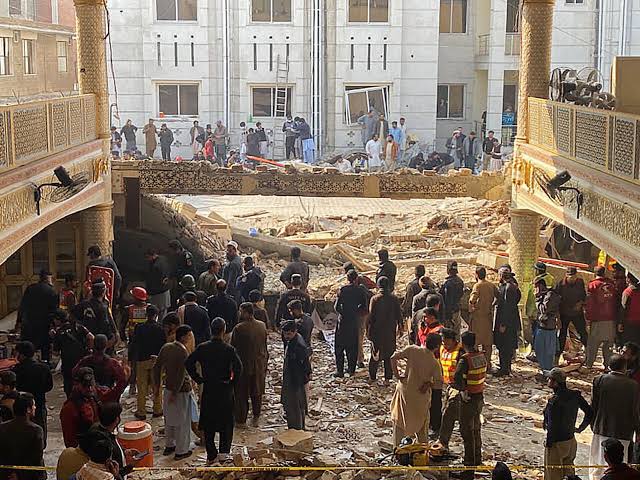According to police, a bomb attack on a mosque inside a security enclosure in the Pakistani city of Peshawar resulted in the deaths of dozens of people.
According to Muhammed Asim, a spokesman for the Lady Reading Hospital in Peshawar, the explosion caused at least 59 fatalities and 157 injuries. Later, the death toll was confirmed by police.
According to police officer Siddique Khan, the perpetrator detonated his bomb while among the worshipers. Officials reported that 27 of the fatalities were police officers.
The Pakistan Taliban (Tehreek-e-Taliban, or TTP), led by Sarbakaf Mohmand, first claimed credit for the attack on Twitter.
Hours later, however, TTP spokesman Mohammad Khurasani denied any involvement in the bombing, claiming that it was against the group’s policy to attack mosques, seminaries, and other places of worship. His made no mention of the reason a TTP commander had taken credit for the bombing.
According to a TTP statement, “Tehreek-e-Taliban has nothing to involvement with this attack.”
The mosque is housed inside a heavily guarded complex that also houses the provincial police force’s headquarters and a counterterrorism division.
Authorities reported that a portion of the structure fell and that several people may be buried beneath the debris.
The main hall of the mosque could hold about 300 people, and according to Peshawar’s police chief Muhammad Ijaz Khan, it was “almost full” at the time of the explosion.
The mosque is located within Peshawar’s Police Lines, a region that is a part of the city’s red zone and contains a number of significant government buildings, including the Khyber Pakhtunkhwa provincial assembly building, the Chief Minister House, and the Governor House.
According to reports, the suicide bomber was seated in the front row during the mosque’s congregational prayers. Policeman Shahid Ali, who escaped the incident, claimed that the bomb happened shortly after the beginning of the prayers.
“I observed a cloud of black smoke ascending. The 47-year-old said to the AFP news agency, “I fled outside to save my life.
He continued, “The screams of the people are still resonating in my mind. “People were yelling for assistance.”
Shehbaz Sharif, the prime minister, referred to the incident as “an attack on Pakistan.” He pledged to take “severe action” against the perpetrators of the crime.
Imran Khan, a former Pakistani prime minister, condemned the bombing on Twitter.
He tweeted, “Strongly condemn the terrorist suicide attack in the Peshawar police lines mosque during prayers.”
“We must strengthen our information collection and adequately equip our police forces to face the evolving menace of terrorism,” the president said.
Attacks have occurred often in Peshawar, the provincial capital of Afghanistan-bordering Khyber Pakhtunkhwa.
In Pakistan’s bloodiest incident since 2018, a suicide bomber hit a mosque there in March of last year, killing 64 people. The bombing was carried out under the auspices of the Islamic State in Khorasan Province, also known as ISIS-K.
In the past year, attacks on law enforcement officers have increased in Pakistan, particularly in the Khyber Pakhtunkhwa region and the southern province of Balochistan.
The TTP, which has been fighting Pakistan for more than ten years, unilaterally ended a truce with the Pakistani government in November of last year.
More than 150 incidents carried out across Pakistan in 2022 by the TTP, a group ideologically connected to the Afghan Taliban, were documented by Pakistan’s surveillance authorities and resulted in the deaths of scores of civilians.
Authorities worry that the Taliban’s success in Afghanistan has given the TTP more confidence and contributed to its comeback.
The group wants that its strict interpretation of Islamic law be imposed, that members who have been detained by the government be freed, and that the merging of Pakistan’s tribal regions with Khyber Pakhtunkhwa province be reversed.





